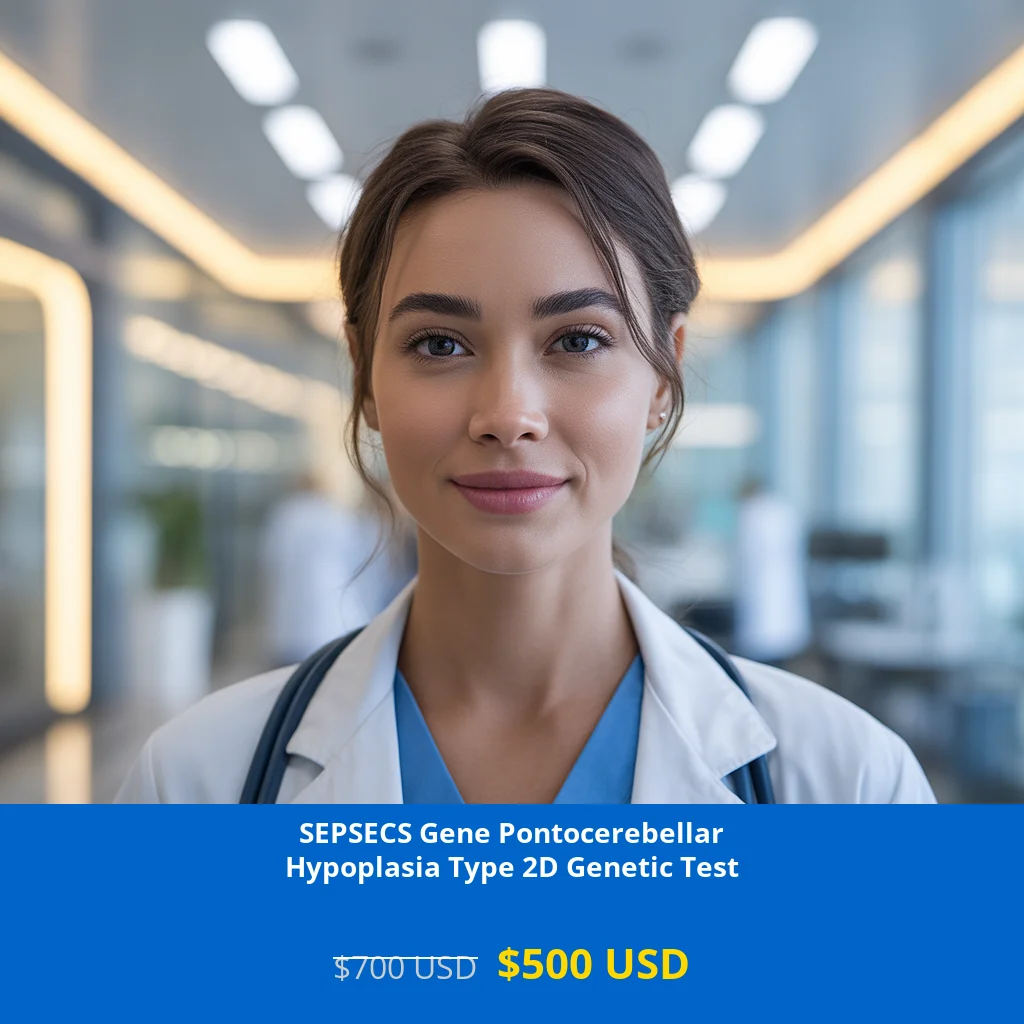SEPSECS Gene Pontocerebellar Hypoplasia Type 2D NGS Genetic DNA Test
Comprehensive Introduction to SEPSECS Gene Testing
The SEPSECS Gene Pontocerebellar Hypoplasia Type 2D NGS Genetic DNA Test represents a cutting-edge diagnostic approach for identifying rare neurological disorders affecting brain development. Pontocerebellar Hypoplasia Type 2D (PCH2D) is an autosomal recessive condition characterized by progressive microcephaly, impaired brain growth, and significant neurological deterioration. This specialized genetic test utilizes next-generation sequencing technology to provide accurate detection of mutations in the SEPSECS gene, enabling early diagnosis and appropriate medical management for affected individuals and their families.
What This Advanced Genetic Test Measures
Our comprehensive NGS-based test specifically targets the SEPSECS gene (SEP (O-phosphoserine) tRNA:Sec (selenocysteine) tRNA synthase), which plays a critical role in selenoprotein biosynthesis. The test detects:
- Point mutations and small insertions/deletions in the SEPSECS gene
- Pathogenic variants associated with Pontocerebellar Hypoplasia Type 2D
- Autosomal recessive inheritance patterns
- Genetic markers for progressive neurological deterioration
Clinical Significance of SEPSECS Gene Mutations
Mutations in the SEPSECS gene disrupt the synthesis of selenocysteine, an essential amino acid incorporated into various selenoproteins. These proteins are crucial for antioxidant defense, thyroid hormone metabolism, and neurological function. The resulting deficiency leads to the characteristic features of PCH2D, including cerebellar and pontine hypoplasia, progressive microcephaly, and severe developmental delays.
Who Should Consider SEPSECS Genetic Testing
This specialized genetic test is recommended for individuals presenting with the following clinical features:
- Infants and children with progressive microcephaly
- Patients exhibiting cerebellar and brainstem abnormalities on neuroimaging
- Individuals with severe developmental delays and intellectual disability
- Children experiencing movement disorders, including dystonia and chorea
- Patients with feeding difficulties and failure to thrive
- Individuals with a family history of similar neurological conditions
- Siblings of affected individuals for carrier testing
Early Clinical Indicators
Early signs that may warrant SEPSECS gene testing include neonatal hypotonia, poor feeding, respiratory difficulties, and abnormal eye movements. As the condition progresses, affected children typically develop spasticity, seizures, and severe cognitive impairment.
Significant Benefits of SEPSECS Genetic Testing
Undergoing SEPSECS gene testing provides numerous advantages for patients and families:
- Accurate Diagnosis: Provides definitive genetic confirmation of Pontocerebellar Hypoplasia Type 2D
- Family Planning: Enables informed reproductive decisions and prenatal testing options
- Medical Management: Guides appropriate symptomatic treatment and supportive care
- Prognostic Information: Helps families understand disease progression and expected outcomes
- Genetic Counseling: Facilitates comprehensive family risk assessment
- Research Contribution: Advances understanding of rare neurological disorders
Understanding Your Test Results
Our comprehensive genetic counseling services help you interpret your SEPSECS gene test results:
Positive Results
A positive result indicates the presence of pathogenic mutations in both copies of the SEPSECS gene, confirming the diagnosis of Pontocerebellar Hypoplasia Type 2D. This information enables:
- Implementation of appropriate medical management strategies
- Access to specialized neurological care and supportive therapies
- Family member testing and carrier identification
- Connection with support groups and research opportunities
Negative Results
A negative result suggests that no pathogenic SEPSECS gene mutations were detected. However, this does not completely rule out the possibility of other genetic causes for similar neurological symptoms. Further testing may be recommended based on clinical presentation.
Variant of Uncertain Significance
In some cases, genetic changes of unknown clinical significance may be identified. Our genetic counselors provide ongoing support and may recommend additional family studies to help interpret these findings.
Test Pricing and Service Details
| Service | Price (USD) |
|---|---|
| Discount Price | $500 |
| Regular Price | $700 |
Additional Service Information
- Turnaround Time: 3 to 4 Weeks
- Sample Type: Blood, Extracted DNA, or One Drop Blood on FTA Card
- Pre-test Requirements: Clinical History and Genetic Counseling Session
- Specialty: Neurology and Genetics
- Testing Method: Advanced Next-Generation Sequencing (NGS) Technology
Nationwide Testing Availability
We provide comprehensive SEPSECS genetic testing services across the United States, with convenient locations in all major metropolitan areas including New York, Los Angeles, Chicago, Houston, Phoenix, and Philadelphia. Our network of certified genetic counselors and neurological specialists ensures you receive expert care regardless of your location.
Take the Next Step Toward Genetic Clarity
If you or your family are experiencing symptoms suggestive of Pontocerebellar Hypoplasia Type 2D, don’t wait to get answers. Our specialized genetic testing provides the clarity needed for informed medical decisions and comprehensive family planning.
Call or WhatsApp us today at +1(267) 388-9828 to schedule your genetic counseling session and book your SEPSECS Gene Pontocerebellar Hypoplasia Type 2D NGS Genetic DNA Test. Our compassionate team is ready to guide you through every step of the testing process and provide the support your family deserves.







